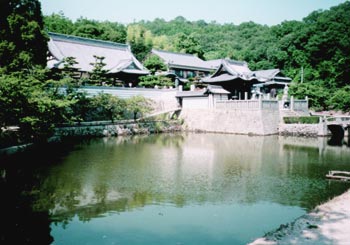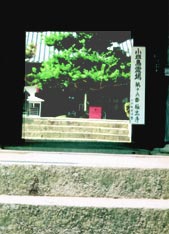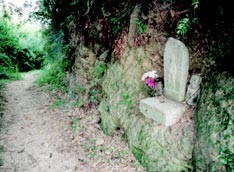A boy of Gokurakuji Temple
Shodoshima-island, located in the Inland Sea of Japan is my home town.
Gokurakuji-temple situates in a town called Uchinomi-cyou.
Some say that this old Buddism temple used to be an execution ground. There stands a grove covered with green trees at the back, and are two patitioned moats in front.
The shadow of edifice casts dark reflections on the moat.
No breeze, and everything is tranquil except the harsh sunshine of high summer.
Gokurakuji-dawa, a pass which leads to the next village is in the vicinity of Gokurakuji-temple.
The pass has a fine lookout over countless rice-fields under eyes, and over a high school building far away.
I visited Mrs.Yamamoto, age 80, who has been a farmer's wife for more than 60 years.
She lives alone at a Japanese-style farmer's house near the temple, surrounded by well cultivated kichen gardens.
After greeting, she said, "I am looking forwards to meet my son's family at Buddism festival on August 15. He works in Nagoya."
Her mother-in-law, passed away at the age of 104 in 1985, kept talking about this Mameda tales.
Mrs. Yamamoto heard it when they sat down on a rice-field path for taking a brief rest.
Doing work at rice field was so fatiguing that taking rests for a while was to be waited so much to farmers.
Mrs. Yamamoto talked to me like this.
In and around Gokurakuji-dawa Mameda sometimes appeared, especially at a drizzling dark night.
When a drunken man, holding a packing Sushi of chip box, walked along unsteadily, a small boy might approach him.
She tells me, "You may know a young boy who run errands at a temple. He is dressed in a white kimono with a pair of short black hakama."
The boy asked a man, "Why do't you enjoy Sumo with me? "
Taking look at the small boy, the man scornfully refused, "You, a tiny creature, are the last man to wrestle with me, hahaha."
The boy suddenly jumped up to his shoulders to cover his eyes by shaping eaves with hands on the cheeks.
Then the boy urged him to walk ahead, although the man did not notice where to head for.
A wicked boy guided him to a big wodden tub, embeded in a vegetable field, in which farmers stored a full of excrements for utirizing as fertilizer.
(Until just a little after the World War Two, in Shodoshima-island farmers made use of excrements instead of chemical fertilizer for vegetable farming.)
WWWh, he fell into the tub from his head!
Alas, he was completely soaked in filth.
Imagine what a horrible smell went off ! Villagers called it a special perfume made in ruaral area.
Snaching away the chip box, Mameda disappeared all of sudden.
I asked Mrs. Yamamoto, "What might have happened if the man said OK to wrestle?"
She said, "In case he is defeated intentionally or not, he might be suffering little. However if he flies Mameda away with all his strength, I hear he might get severely injured."
It is surprising that she heared that the next door old man, he was so old that villagers called him "a man with walking sticks at each hand", came across with Mameda.
After doing farmworking, he hurried on his way back home.
It was getting dark just as he came to the pass. He noticed a small errand-boy was coming this way.
He recognized the whiteness of a boy's kimono.
The old man muttered in mind, "Wow, he could be Mameda!". Yes, it was Mameda.
The boy proposed to engage in sumo. No sooner did the old man run away, Mameda jumped up at his shouldars.
He became a victim of the goblin.
He talked to her, "My body smelled bad in stink. I must have taken off all my clothes before getting in my house."



In some folk tales at rural areas, Kappa instead of Mameda asks to engage in sumo.
Kappa would never loses the game as long as he keeps water in a bowl on his head.
In terms of asking for wrestling to a man passers-by. both are common.
But Mameda goes far.
I wonder why he is much more wicked than Kappa.